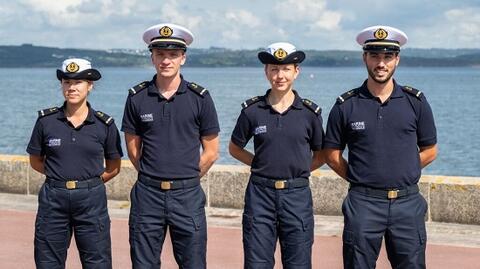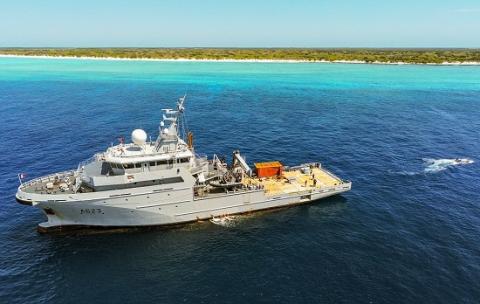
Three questions for the students selected for the Bougainville mission
Mathilde, Thomas, Hugo and Manon are Master’s students at Sorbonne University. The first three are studying marine sciences and the last one is studying ecophysiology and ecotoxicology. All four are winners of the call for applications for the Bougainville mission. In October 2023, they will embark for a year on two French Navy ships to study the ocean microbiome.
Why did you apply for the Bougainville mission?
Mathilde: I've always been fascinated by the incredible wealth of microscopic organisms that inhabit marine environments. At a time when science is becoming increasingly aware of the importance of the microbiome for the health of the oceans, I saw the Bougainville mission (link in French) as a unique opportunity to contribute to the study of planktonic ecosystems, all in an unprecedented working environment.
Hugo: What interested me, was the singularity and scientific importance of the mission, but also the mediation aspect. The collaboration between the French Navy and Sorbonne University will give me the opportunity to get involved in research in a different way.
Thomas: This mission is a unique opportunity. It will enable me to combine my interest in plankton while working with researchers to test and improve inexpensive sensors, which I believe represent the future of data acquisition in marine ecology.
Manon: I have always been captivated with oceanographic expeditions like Tara Océan. The Bougainville mission is a unique opportunity to live an extraordinary personal and scientific experience. It's a dream come true to be able to work in a field I'm passionate about, while having an adventure and discovering new horizons. Since the mission is in partnership with the French Navy, it will also enable me to discover a world I don't know much about.
What are you expecting?
M.: I think it will provide the scientific community with answers, thanks to innovative measuring instruments. I'm looking forward to talking to the French Navy crews and the public once we're ashore!
H.: This experience is going to be enriching from every point of view: human, scientific... I'm also going to be able to put my skills in project and team management to good use.
T.: There's the element of adventure that attracts me to this project. Going to sea for several weeks and being able to put my knowledge into practice in an unfamiliar environment is an excellent way of testing myself and developing my independence. Life on board will also enable me to meet people from different backgrounds, who all share an interest in the marine environment.
M.: I'd like to be able to contribute to scientific knowledge by providing new data from areas that are rarely sampled. I hope to experience a real adventure, discovering new people and new landscapes.... I'm also aware that this mission will enable me to acquire new skills that will be invaluable throughout my professional career. All in all, I'm expecting a lot from this assignment. I'm sure it will leave a lasting impression on me, and that I'll be able to make the most of it both professionally and personally.
You'll be taking on scientific responsibility with full autonomy. How have you prepared for this?
M.: We all received high-level training at the Institut de la Mer de Villefranche, followed by military training at the Naval Academy, to prepare us as best as possible to collect samples in the specific context of naval vessels. I'm sure that my experience of an oceanographic campaign in the Indian Ocean last year during my Master's degree will be very useful to me in terms of versatility and managing the unexpected on board.
H.: I've prepared myself by studying the different tools I'll be using on this mission. I've also been in contact with several people working in the armed forces to prepare myself for the position of Officer Aspirant Volunteer.
T.:My experience of a previous campaign showed me that many problems can disrupt data collection. Being aware of the different types of problems that can arise, and knowing how to deal with them, means you're ready to face them without panicking.
M.: During my various internships and student jobs, I have acquired a certain autonomy in the tasks entrusted to me. I did my Master's internship in my second year, during which I took on various scientific responsibilities.

